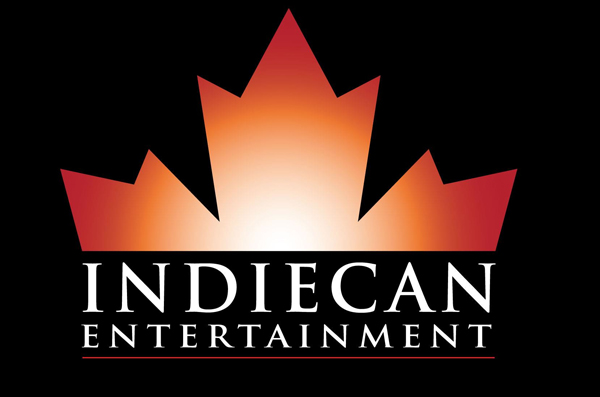
Avi Federgreen and Canada’s Independent Film Market
Entertainers, Interviews
Why did you start Indiecan Entertainment?
A: It’s important to me that Canadian audiences watch Canadian film. Indie films matter. These are emerging filmmakers for the most part that are making their first or second films and in order for them to continue to make films people need to see these early films. And some of them are very good and some of them deserve a run in theatres and on television or on DVD and I want to be here to see those people move on to that next level. If people don’t support them then they’ll never get future films made.
I’ve been in the film business for 18 years, producing for about 6 years, I’ve made films that couldn’t get a distributor to take, or watched friends make films and hope to get them into to five or six theatres and ended up being lucky to get into one.
Mongrel, eOne etc., can only take on so many movies. Let’s say 250 movies are made in Canada in a year, not even 10% will get distribution. I felt there were at least 10-20 films that deserved to find an audience, I felt I needed to do something about it. I’m now involved in working on three films, hopefully by the end of the year I’ll have close to ten.
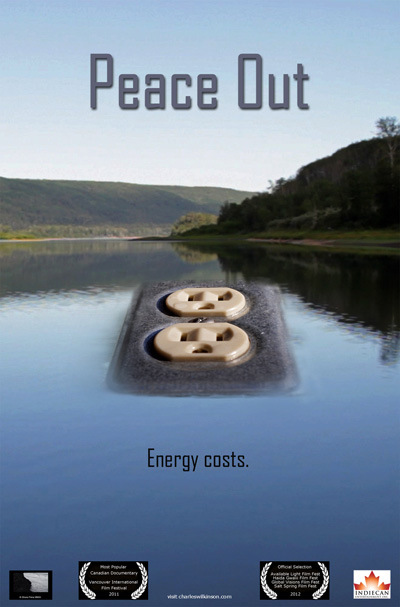
Peace Out is being distributed through Indiecan Entertainment.
Do indie artists have a good business sense? Would you advise indie filmmakers to become more educated in business?
A: The film industry is no different than the music industry, the publishing industry or any other culture industry in Canada. Indie artists “are fighting the same fight”, which is getting money to help make their art, getting people to listen, watch, read, hear their stuff, we’re all in this together; we’re here to fight for our cultural lives. Me as a filmmaker first and as a distributor second feel I have a responsibility to help see our industry move forward and get people to listen.
How do you classify an indie film?
A: Well for Moon Point, we made it without big money, with a small budget, with less than 10 people crew wise. We made a film unconventionally per Canadian standards, distributing in a non-conventional manner as well. Anyone who thinks you have to buy big newspaper, radio or TV ads to get people to see your film is nonsense, social media drives audience now. Word of mouth drives audience. If you make a good film people are going to talk about it. To me that’s the future, digital is the future. The days of going and seeing a movie shot and projected in 35 mm are over. By this summer Cineplex Odeon will have removed all its 35 mm projectors and it will be straight digital, and that’s a big deal.
Do you welcome this change?
A: Whether I like it or not the ship is moving forward so you have to go with it. I am still a purest though, I think you can tell a film that’s been shot on film and not and one that’s been projected on film and not, I think film is amazing, but you know conventionalism tells you what is the most economic thing for both filmmakers and exhibitors and that’s digital, so you just have to go with it.
The cream will rise to the top. Those that have pure talent to make films will make films.
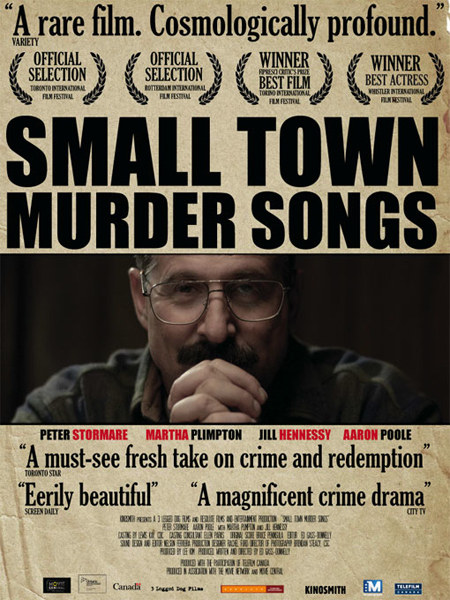
I mean I look at a guy like Ed Gass-Donnelly who made a movie, Small Town Murder Songs and now he is going to start directing the sequel to the Last Exorcism 2. So this is a Canadian director who made low budget film, under 1 million I believe, who is now directing a big studio feature.
A guy like Brad Peyton who started his days in early animated television is now directing Cats & Dogs 2, a 60 million dollar plus theatrical feature. We have a great talent pool in Canada of actors, writers, producers, you know crew people that are probably more talented than many in Los Angeles—we’re creating a great film industry in this country in every province. We have the ability to tell really great stories and should continue to do so, despite the cost and get them out there for people in this country and outside this country to see.
What are your thoughts on piracy?
A: Well as a producer I can tell you that piracy kills my opportunity to realize any money through digital or DVD. I’ve been in places in the city where before my movie even came out copies were being sold at various locations around Toronto. In one spot I confiscated 150 copies of a movie I had made and it hadn’t even been released on DVD yet. So ya, I can tell you it’s real. These people are not only going into theatres and filming the projected movie but they are making copies and selling them in flea markets in North Toronto, in DVD stores on College St., Bloor St., and probably on three films that I’ve co-produced or produced, I myself have confiscated over 300 copies that were illegally made. An online site in Russia was selling my movie two months before the movie came out on DVD.
So, people really need to stop buying pirated content.
A: Listen you can buy a digital movie for as low $2.99 / $4.99. If you are prepared to pay five bucks to go to Starbucks and buy a coffee why wouldn’t you pay five bucks to see a good movie? I mean some films that took 16 years to make and then to never see a penny from it because of this – it’s grotesque.
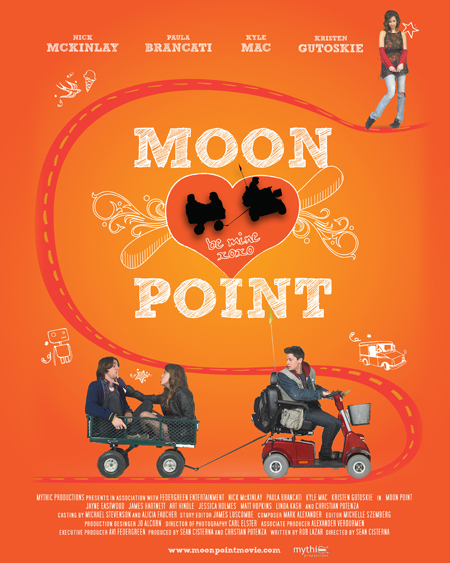
One thing you are really trying to do is get people back into the theatre. How?
A: We don’t do anything to entice families to go see movies or to get people out to the theatre – those days are gone and we need to bring them back.
What I’m trying to do with Moon Point is we’re having a special screening followed by a live concert (Feb. 2nd), Q & A’s on opening weekend at AMC; we want to share our experiences with people who want to know how to make indie films. We’re going to have merchandise at these screenings and we are releasing a physical CD soundtrack with over 20 Canadian artists such as The Danger Bees, City and Colour, Michou, all of which contributed their songs to the film.
Any companies, publications or outlets you recommend?
A: There are great indie organizations such as Raindance, which started in the UK. They are a great place to get tips and take courses on filmmaking.
If you want to be a filmmaker then go to film school. Ryerson, U of T, York, Humber, Centennial – they all have great film programs. I didn’t go to film school I learned on the set how to make a movie, but when I was nine I knew this was what I wanted to do. I didn’t get into film school so I went to computer school and then quit a really good job to get into the film business. I started at the bottom and I worked my way up.
Should filmmakers have high expectations of succeeding right away?
A: My goal when I got into the film business was to produce my first feature within fifteen years, and on my fifteen year I produced my first feature film. Nothing comes fast in this business, sweat, passion, sacrifice, dedication and a willingness to learn are all really important. And then if you want to produce – finding the right material is important. I mean I read over a hundred scripts a year, probably forty books just to find good material and I don’t jump at anything because I’m very picky and you need to be because it’s like having a baby, you live with this project for years and years and years and if you are not deeply passionate about it then you shouldn’t get involved with it.
Who do you respect in the film business?
A: For me it was never about an individual person, it was about going to the movies and experiencing, learning from everything I watched. I learn something from pretty much every movie I watch. I think it’s important to have an open mind when watching a film, seeing what works and what doesn’t, ‘cause you can apply that to any project and it all starts with a good script.
It’s about finding good stories to tell, once you have that everything else comes so I think that’s where I based myself on. I think back to when I was growing up and attention to detail was big, being very picky about what studios were using and what filmmakers were making was important. Now there is no attention to that. Now it’s how much money can we make, whether it’s good or crap and I think the luster has worn off in concentrating on making really good films. But then I look at films today, like The Artist, Moneyball and Tree of Life and think, “god I wish I could of made that.”
People like Scorsese, Coppola, Spielberg, Lucas are why we are making big budget films today. But I have a lot of respect for those who are making the lower budget films too. A guy like John Hughes who made low budget films that appealed to a very specific audience, well his movies still ring true today, those movies are making comebacks.
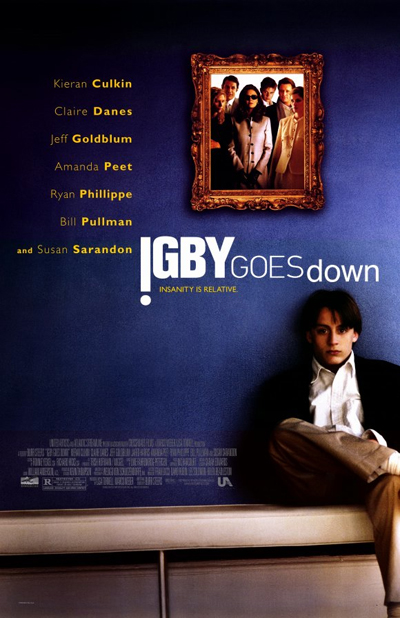
You look at a movie like Garden State or Some Kind of Wonderful and Igby Goes Down, I mean those are story-driven films directed at a very specific audience, a young audience, and they are not big budget blow ‘em up shoot ‘em up films, they are concentrated on story, they’re concentrated on character, people love that stuff and we don’t make enough of that. Making a low-budget film can work, if you do it smart.
Words of advice?
A: Hard work, keenness to learn, good instinct on creative and passion will get you far. If the fire doesn’t burn in your belly to be in this business then you shouldn’t get in cause that’s what needs to drive you.
People ask me how do you know when you’ve made a good movie and I say:
When people go to a coffee house or a bar afterwards and they spend two to three hours talking about your film, that’s when you know you’ve made a good movie. I mean clearly you’ve done something to create a conversation (good or bad). I’d rather create a conversation about my movie than people just not talking. And before you even get remotely involved with it you need to ask questions like who is your audience because if you don’t have anyone to go see it then why make it?
Moon Point, the first film from Indiecan Entretainment opened on February 3rd at AMC Yonge and Dundas, Toronto. Q&A’s with the cast and filmmakers took place after evening screenings.
WATCH THE TRAILER:
